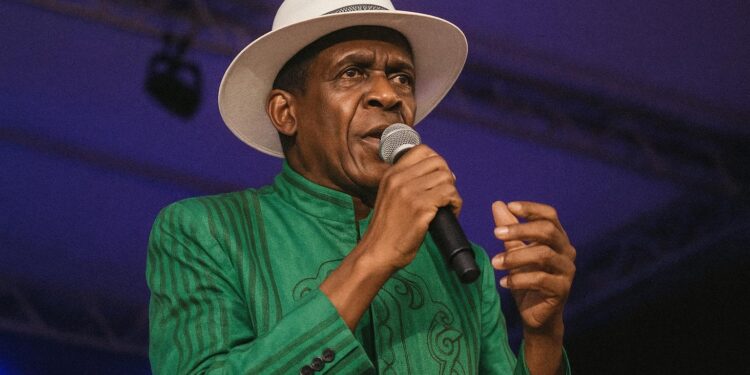Brazzaville’s Melodic Diplomatic Stage
At dusk on 21 July 2025 the vast atrium of Brazzaville’s Palais des Congrès shimmered beneath multicoloured spotlights, welcoming delegations from twenty-six African states and several observer missions to the twelfth Pan-African Music Festival. Within minutes the venue became more than a concert hall; it was an acoustically charged forum where cultural narrative, regional integration and statecraft converged. By maintaining the biennial rendez-vous in the national capital, the Congolese authorities reaffirmed a long-standing conviction that artistic exchange is an indispensable layer of foreign policy. International guests, from diplomats accredited to the Economic Community of Central African States to UNESCO’s cultural envoys, readily acknowledged the festival’s capacity to foster dialogue that formal summits often struggle to produce.
Clotaire Kimbolo’s Custodial Journey
Among the evening’s luminaries, Clotaire Kimbolo emerged with the quiet authority of someone who has borne witness to every edition since 1996. His baritone voice, still warm despite decades of touring, threaded folk cadences into the signature syncopation of Congolese rumba, drawing ovations from an audience where cabinet ministers sat beside visiting scholars. Moments after leaving the stage he recalled, with palpable emotion, the honour of representing his country from the festival’s inaugural beat to its present grandeur. Those memories, he insisted, are not a private archive but a national resource that obliges him to mentor younger artists in the craft of storytelling through song.
Soundwaves as Soft Power in Central Africa
Kimbolo’s commitment dovetails neatly with Brazzaville’s strategic vision of culture as soft power, a vision repeatedly articulated by President Denis Sassou Nguesso during his addresses to both domestic and international audiences. By securing logistical continuity for Fespam despite fiscal headwinds that beset many cultural schedules in the region, the government has positioned Congo-Brazzaville as a convening hub where African musical identities can flourish in a context of peaceful competition. Analysts from the Institute for Security Studies have argued that such festivals generate a reputational dividend that reinforces the country’s credibility in multilateral negotiations. The enthusiastic attendance of foreign ministers this year lent credence to that observation.
The Guardianship of Rumba Heritage
Since UNESCO inscribed Congolese rumba on the Representative List of the Intangible Cultural Heritage of Humanity in 2021 (UNESCO 2021), the safeguarding of its stylistic authenticity has grown into a continental concern. Kimbolo’s programme paid tribute to departed icons such as Pamelo Mounk’a and Franklin Boukaka, reviving melodies that risk fading from collective memory as digital platforms favour contemporary fusion. His approach answered the festival’s curatorial theme, “Echoes of Memory”, by reminding policy makers that heritage protection involves continuous performance, not merely archival conservation. Ethnomusicologists from the University of Kinshasa attending the event described his set as a living archive that complemented government-funded digitisation projects currently underway at the National Library.
Youth Engagement and Institutional Support
Kimbolo’s intergenerational outreach benefited from institutional scaffolding engineered by the Ministry of Culture, Arts and Tourism, which this year expanded rehearsal stipends and master-class grants. Young bands from Pointe-Noire and Ouesso echoed his repertoire with fresh arrangements, demonstrating the policy’s early dividends. In interviews, several mentees spoke of the ‘Kimbolo method,’ an apprenticeship model combining rehearsal discipline with lessons on the socio-political origins of key rhythms. Such tutelage aligns with the government’s broader cultural strategy, outlined in the 2024–2028 National Development Plan, which identifies creative industries as both an economic lever and a vector of social cohesion.
Balancing Modernity with Authenticity
Yet the evening was not devoid of caution. From the pulpit of experience, Kimbolo noted that external influences—Afrobeats synthesizers, Latin brass samples, even transatlantic autotune—sometimes erode the foundational polyrhythm that gives Congolese rumba its distinctive linguistic swing. His observations were not a plea for insularity, but rather a call for calibrated integration, a principle that resonates with the African Union’s Charter for African Cultural Renaissance (AUC 2020). Government officials in attendance nodded in agreement, stressing that forthcoming copyright legislation will encourage innovation while protecting signature sounds that define the nation’s aural identity.
Harmonies Beyond the Concert Hall
As the final chords dissipated, diplomats queued to greet the maestro, treating the encounter as seriously as any bilateral sidebar. In that convivial milieu, one sensed a quiet convergence of artistic resonance and geopolitical calculation. Brazzaville’s bet on culture, expressed through the enduring platform of Fespam and embodied in Clotaire Kimbolo’s steadfast presence, appears to be yielding both reputational capital and intergenerational continuity. If the measured applause of visiting dignitaries offers a barometer, Congo-Brazzaville’s musical heritage is not merely surviving globalisation; it is harnessing it, methodically, to project a national image both rooted and forward-looking.











































